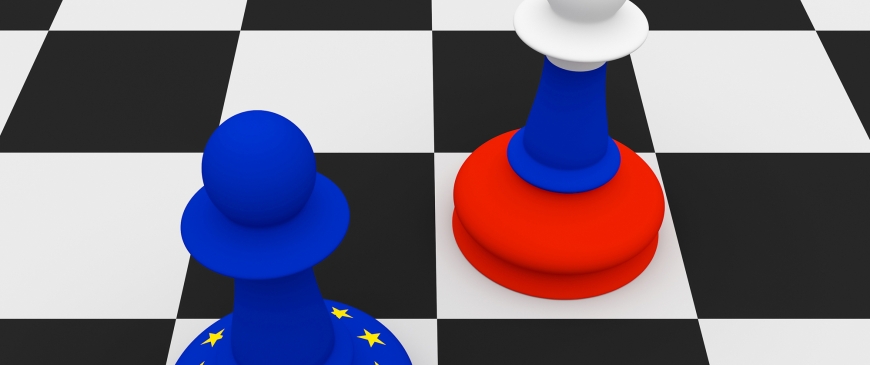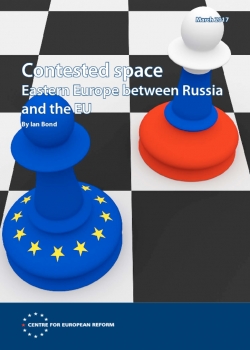
Contested space: Eastern Europe between Russia and the EU
- A quarter of a century after the Soviet Union collapsed, the states that emerged from it are dogged by its legacy. Their relations with Russia, the EU and in some cases each other are unstable and sometimes hostile.
- The six states participating in the EU’s Eastern Partnership (Armenia, Azerbaijan, Belarus, Georgia, Moldova and Ukraine) find themselves between a wary EU that would like to see them prosper but is not prepared to embrace them as fully European, and an assertive Russia that wants to keep them within its sphere of influence at all costs.
- These countries have developed in very different ways, both domestically and in their relations with Russia and the West. For most of them, the West is now a more important economic partner than Russia. But politically, some aspire to get closer to the West, some look to Russia, and Azerbaijan keeps its distance from both.
- The EU and Russia have both soft and hard power instruments available to influence the direction of travel of the six. Yet both have often used their power in ways that have undermined their influence. Neither the Russian-dominated Eurasian Economic Union (EAEU) nor the EU’s Eastern Partnership can point to great success.
- Russia has targeted large Russian-speaking populations in Eastern Partnership states with propaganda designed to turn them against Western institutions. But its willingness to use economic and military power against its neighbours has often alienated those who might otherwise align themselves with Russia rather than the EU culturally or economically.
- Russia’s fear, however ill-founded, that Eastern Partnership countries would fall into the Western orbit has led it to rely on various methods of coercion to prevent that happening. Russian troops occupy parts of Georgia, Moldova and Ukraine, and are stationed (with the concurrence of the host states) in Armenia and Belarus. Russia has used economic sanctions for political purposes against Georgia, Moldova and Ukraine.
- On the EU side, the Eastern Partnership remains a programme without a clear objective. While the EU regarded the countries of Central Europe, and the Baltic States, as fully European and therefore eligible to join the Union, there has never been consensus on whether any of the former Soviet states should be given a perspective of membership (however distant and hedged with conditions).
- The result is that the association agreements negotiated with the most pro-EU countries (Georgia, Moldova and Ukraine) have been treated as technocratic exercises, devoid of political implications. And the EU has sometimes seemed willing to turn a blind eye to corrupt practices by politicians who call themselves pro-European. Populations that wanted their countries to integrate more closely with the EU have become disillusioned.
- At the same time, the West has made things worse by promising Georgia and Ukraine NATO membership without ever intending to make good on its promise. In so doing the West has provided Russia with a pretext for destabilising both countries, but has not been willing to defend them.
- The election of Donald Trump as American president, and the prospect of Britain leaving the EU, are likely to exacerbate the problems of this ‘grey area’ in Europe. Even the remote possibility of membership of Western organisations for former Soviet states is likely to vanish. And Trump’s infatuation with President Putin could lead him to concede Eastern Europe as a Russian sphere of influence.
- If Eastern European countries are unlikely to join Western institutions for the foreseeable future, and do not want to join Russian ones, what can they do? They need to work on increasing their internal resilience, rather than hoping that the West will save them.
- To do that, their top priorities should be to establish the rule of law; ensure that minority ethnic groups are fairly treated and have a stake in society; and try to maintain good political and trade relationships with Russia, while ensuring that these relations are based on sovereign equality and mutual advantage. And they should strengthen their links with other major powers, including China, in order to increase the number of countries with a stake in their sovereignty and stability.
- For the West, the challenge is to balance the theoretical right of the Eastern Partnership countries to aspire to join the EU and NATO with the practical reality that they are far from meeting the conditions for membership, and the political reality that the West has no desire to confront Russia over them. The West should use the coming years to persuade Moscow that, whether or not these countries ultimately join Western institutions, it is in everyone’s interests that they should be prosperous, stable and well-governed.
- For Russia, the challenge is to see its neighbours in a different light, as sovereign states that are potential partners, not as a threat that can only be countered by weakening them.
Copyright is held by the Centre for European Reform. You may not copy, reproduce, republish or circulate in any way the content from this publication except for your own personal and non-commercial use. Any other use requires the prior written permission of the Centre for European Reform.


Comments